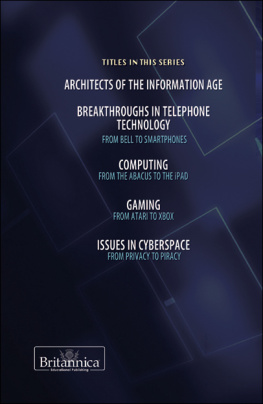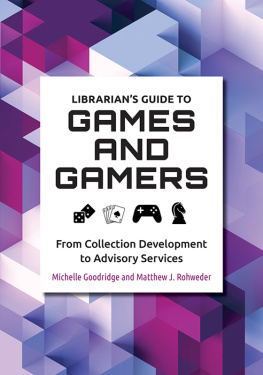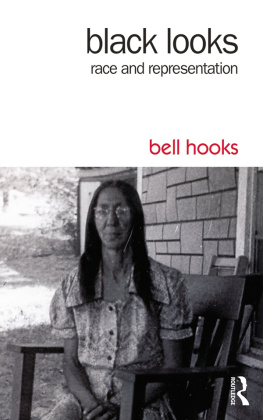INTERSECTIONAL
TECH
Published by Louisiana State University Press
www.lsupress.org
Copyright 2020 by Louisiana State University Press
All rights reserved. Except in the case of brief quotations used in articles or reviews, no part of this publication may be reproduced or transmitted in any format or by any means without written permission of Louisiana State University Press.
DESIGNER: Michelle A. Neustrom
TYPEFACES: Chaparral Pro, text; Cervo Neue, display
Cover image: 4khz/iStock.com
Parts of this work appeared in previous publications but have been significantly revised for this book. Portions of chapter 2 first appeared in the coauthored piece (with Jordan Mazurek) Visualizing Blackness Racializing Gaming, in Routledge International Handbook of Visual Criminology, ed. Michelle Brown and Eamonn Carrabine (London: Routledge, 2017), 36275, essay 2017 by Kishonna Gray and Jordan Mazurek, reproduced with permission of The Licensor through PLSclear. Portions of chapter 3 first appeared in Jason, the Klan, and Killing Monstrous Others in Friday the 13th, the authors post on the Not Your Mamas Gamer blog, June 30, 2017. Portions of chapter 4 first appeared in Solidarity Is for White Women in Gaming, in Diversifying Barbie and Mortal Kombat: Intersectional Perspectives and Inclusive Designs in Gaming, ed. Yasmin B. Kafai, Gabriela T. Richard, and Brendesha M. Tynes (Pittsburgh: ETC Press, 2016), 5970. Portions of chapter 6 first appeared in Gaming Out Online: Black Lesbian Identity Development and Community Building in Xbox Live, Journal of Lesbian Studies, 22:3 (2018), 28296, DOI: 10.1080/10894160.2018.1384293. https://www.tandfonline.com/. Portions of chapters 3 and 6 first appeared in Theyre Just Too Urban: Black Gamers Streaming on Twitch, in Digital Sociologies, ed. Jessie Daniels, Karen Gregory, and Tressie McMillan Cottom (Bristol, UK: Policy Press, 2017), 35568, republished with permission of Policy Press, an imprint of Bristol University Press, UK.
Cataloging - in - Publication Data are available from the Library of Congress.
ISBN 978-0-8071-7122-6 (cloth: alk. paper) ISBN 978-0-8071-7455-5 (pbk.: alk. paper) ISBN 978-0-8071-7440-1 (pdf) ISBN 978-0-8071-7439-5 (epub)
In memory of
Susan Banks (OneOddGamerGirl)
and
Trey Loyal (Cityboy AKA City Life) ...
Gamers gone too soon
CONTENTS
, by Anita Sarkeesian
FOREWORD
Your silence will not protect you.
AUDRE LORDE
Loud, intelligent, and bold proclamation of the importance and centrality of marginalized experiences in the games community today is still, frustratingly, met with doubt, gaslighting, dismissal, or hostility. The mere act of acknowledging that not all bodies, whether of avatars in a game or of players behind the screens, are treated the same is, I would say, a courageous one. This is an act that Dr. Kishonna Gray has made central throughout her career. I have no doubt that Gray is keenly aware of the magnitude of producing a book like Intersectional Tech within a space so often occupied by privileged bodies. To have the audacity to centralize Blackness in our white technoculture illustrates the importance of this qualitative intervention in examining the realities of Black lives in gaming spaces.
I have previously stated, If we were to judge by the history books, it would be easy to think that men were pretty much the only people who mattered in history or at least, the only ones worth remembering. This can also be said of books around media, technology, and culture. But with the explosion of books on race, from Safiya Nobles Algorithms of Oppression to Andr Brock Jr.s Distributed Blackness to Ruha Benjamins Race after Technology, we are in an era when we cant ignore Black interventions within technology or the historical impacts of Black expressive culture on our mediated world.
Grays book is in conversation with these scholars, and it adds the dimension of gaming, a space that rarely engages meaningfully around race. While academic gaming culture has spent time focusing on gender and sexuality, Gray is adamantly continuing to center discussions of race, acknowledging and honoring the Black users who presently and historically influence gaming culture.
It too often falls to marginalized folks to undertake the exhaustive labor of illustrating and proving our own oppression to those who oppress us, to convince them that our experiences, which are significantly different from the experiences of those with privilege, are real and impactful in ways to which they might be blind. Let me tell you from experience, this work is exhausting, and I am endlessly thankful for the stamina and tenacity of thinkers like Gray who are willing to do that labor.
As a cis woman who occasionally passes for white, I am hyperaware of the privileges I hold and the responsibility I have to help create a liberated world free of white supremacy, patriarchy, heteronormativity, and all forms of oppression. It is my deepest hope that it is not simply folks who see their experiences reflected in the pages of Intersectional Tech who will engage with this material, but that it also will reach everyone else, who might be new to these concepts or who are seeking updated avenues and lenses through which to explore these complex conversations about identity and intersectionality.
In recent years, we have seen an emphasis on acknowledging white womens representations in games. But the discussions about increasing sincere, genuine representations in games must be an intersectional one. This book asks us to take a deeper look at the slowly widening landscape of Black characters. Has there been actual progress in the past decade? Was 2016 really the year of the Black gamer? Do Black men in games still get stereotyped as criminals? Do Black women even exist in games yet? Gray navigates gender and race, nudging us toward a more complex understanding of the liminal space floating between progress and stagnation.
What I admire most in this book is the range and depth of analysis. It seamlessly integrates representations in games, player and streamer experiences, the roles that social media play in our lives, biased hardware, and the overarching politics of it all, while also doing what the title says: acknowledging a full range of intersecting identities. There is much exploration of Blackness, but that is in cooperation with gender, queerness, ability, and more. That depth of analysis makes it even more striking that Gray also values qualitative inquiry into mediated tech spaces. While similar texts are theoretically driven, offering necessary critiques of the reciprocal impacts of human and machine engagement, Grays ethnographic approach puts narrative at the core, keeping extensive stories and dialogues intact.
The pages of this text also illustrate the distance between user and producer, which is increasingly dwindling, with the lines between the two constantly blurring. But while white users of streaming technologies, for example, have seamlessly made the transition from user to producer, the racial schema of whiteness continues to exclude Black users from centers of production. Nonetheless, Black streamers persist without fanfare or massive numbers of followers and are comfortable within their niche.
Without spoiling anything, I can say that the reader is in for a treat around the digital storytelling practices of TastyDiamond, a Black woman streamer who adopts traditional Black communication practices of humor, singing, comedy, and other modes of engaging traditional Black audiences. I love the way Gray allows these individuals to just exist and doesnt feel the need to explain or make legible the lives of Black folks (especially for white, academic audiences). Thats the power of Intersectional Tech. It offers no apologies for laying out uncomfortable truths that mainstream audiences too often try to ignore (unless they can commodify and appropriate culture for profit, but thats another book).
Next page








